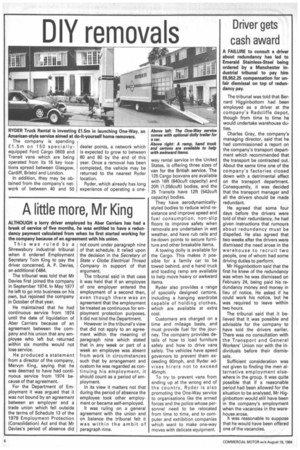A little more, Mr King
Page 8

If you've noticed an error in this article please click here to report it so we can fix it.
ALTHOUGH a lorry driver employed by Aber Carriers has had a break of service of five months, he was entitled to have a redundancy payment calculated from when he first started working for the company because of an agreement with his union.
This was ruled by a Shrewsbury industrial tribunal when it ordered Employment Secretary Tom King to pay the driver concerned, A. P. Davies, an additional £484.
The tribunal was told that Mr Davies first joined the company in September 1974. In May 1977 he left to go into business on his own, but rejoined the company in October of that year.
He maintained that he had continuous service from 1974 until the date of liquidation of Aber Carriers because of an agreement between the company and his union that any employee who left but returned within six months would not lose service.
He produced a statement from a director of the company, Mervyn King, saying that he was deemed to have had continuous service from 1974 because of that agreement.
For the Department of Employment it was argued that it was not bound by an agreement between an employer and a trade union which fell outside the terms of Schedule 13 of the 1978 Employment Protection (Consolidation) Act and that Mr Davies's period of absence did not count under paragraph nine of that schedule. It relied upon the decision in the Secretary of State v Globe Electrical Thread Company in support of that argument.
The tribunal said in that case it was held that if an employee of one employer entered the employment of a second then, even though there was an agreement that the employment be treated as continuous for employment protection purposes, it did not bind the Department.
However in the tribunal's view that did not apply to an agreement within the meaning of paragraph nine which stated that in any week or part of a week an employee was absent from work in circumstances such that by arrangement and custom he was regarded as continuing his employment, it should count as a period of employment.
In its view it matters not that during the period of absence the employee took other employment or became self-employed.
It was ruling on a general agreement with the union and on balance the tribunal felt it was within the ambit of paragraph nine.








































































